Related Research Articles

Jethro Tull are a British progressive rock band formed in Blackpool, Lancashire, in 1967. Initially playing blues rock and jazz fusion, the band soon incorporated elements of English folk music, hard rock and classical music, forging a signature progressive rock sound. The group's lead vocalist, bandleader, founder, principal composer and only constant member is Ian Anderson, who also plays flute and acoustic guitar. The group has featured a succession of musicians throughout the decades, including significant contributors such as guitarists Mick Abrahams and Martin Barre ; bassists Glenn Cornick, Jeffrey Hammond, John Glascock, Dave Pegg and Jonathan Noyce; drummers Clive Bunker, Barrie "Barriemore" Barlow and Doane Perry; and keyboardists John Evan, Dee Palmer, Peter-John Vettese and Andrew Giddings.
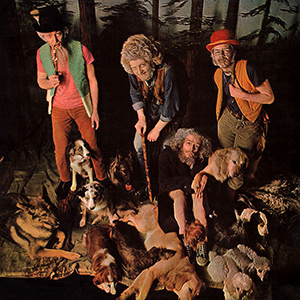
This Was is the debut studio album by the British rock band Jethro Tull, released in October 1968. Recorded at a cost of £1200, it is the only Jethro Tull album with guitarist Mick Abrahams, who was a major influence for the sound and music style of the band's first songs. When the album was released the band was performing regularly at the Marquee Club in London, where other successful British groups, such as the Rolling Stones and the Who, had started their careers.

Stand Up is the second studio album by British rock band Jethro Tull, released in 1969. It was the first Jethro Tull album to feature guitarist Martin Barre, who would go on to become the band's longtime guitarist until its initial dissolution in 2012. Before recording sessions for the album began, the band's original guitarist Mick Abrahams departed from the band as a result of musical differences with frontman and primary songwriter Ian Anderson; Abrahams wanted to stay with the blues rock sound of their 1968 debut, This Was, while Anderson wished to add other musical influences such as folk rock.

Benefit is the third studio album by the British rock band Jethro Tull, released in April 1970. It was the first Tull album to include pianist and organist John Evan – though he was not yet considered a permanent member of the group – and the last to include bass guitarist Glenn Cornick, who was fired from the band upon completion of touring for the album. It was recorded at Morgan Studios, the same studio where the band recorded its previous album Stand Up; however, they experimented with more advanced recording techniques.

You Can All Join In is a budget priced sampler album, released in the UK by Island Records in 1968. It was priced at 14 shillings and 6 pence (£0.72), and reached no. 18 on the UK Albums Chart that year.

Clive William Bunker is a British drummer. Bunker is best known as the original drummer of the rock band Jethro Tull, playing in the band from 1967 until 1971. Never a self-professed technical drummer, Bunker engaged with the essence of blues and rock and roll, influenced by Ginger Baker and Mitch Mitchell. He was also inspired by Buddy Rich and The Hollies' Bobby Elliott.
Michael Timothy Abrahams is an English guitarist and band leader, best known for being the original guitarist for Jethro Tull from 1967 to 1968 and the frontman for Blodwyn Pig.

Living with the Past is a live album by Jethro Tull. The first half contains material from the Hammersmith Apollo performance on 25 November 2001 and features songs from different eras of Tull's history as well as some pieces from Ian Anderson's solo albums: "The Habanero Reel", "The Water Carrier" from The Secret Language of Birds and the instrumental "In the Grip of Stronger Stuff" from Divinities: Twelve Dances with God. Aside from "Cheerio", other recordings are collected in the second half.
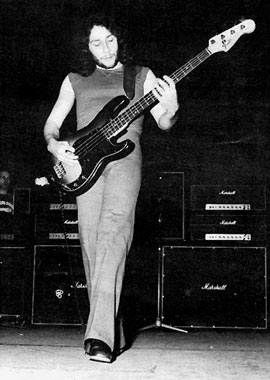
John Glascock was a British musician. He was the bassist and occasional lead vocalist of the rock band Carmen from 1972 to 1975; and the bass guitarist for progressive rock band Jethro Tull from 1976 until his death in 1979. Glascock died at the age of 28 as a result of a congenital heart valve defect, which was worsened by an infection caused by an abscessed tooth.

Glenn Douglas Barnard Cornick was an English bass guitarist, best known as the original bassist for the British rock band Jethro Tull from 1967 to 1970. Rolling Stone has called his playing with Tull as "stout, nimble underpinning, the vital half of a blues-ribbed, jazz-fluent rhythm section".

The Best of Jethro Tull – The Anniversary Collection is a greatest hits album by Jethro Tull, released in 1993. It includes some of the band's biggest hits from 1968 to 1991.

The Essential (2003) is a greatest hits album by Jethro Tull, digitally remastered. The songs included and their order are the same as Tull's first greatest hits album, M.U. – The Best of Jethro Tull. It is not to be confused with the similarly named Jethro Tull compilation "Essential", released in 2011.

Living in the Past is a double LP compilation album by Jethro Tull, released in 1972. It collects album tracks, outtakes and several standalone singles spanning the band's career up to that point. Also included are the 1971 "Life Is a Long Song" EP and two live recordings taken from a performance at New York City's Carnegie Hall in November 1970.

"Living in the Past" is a song by British progressive rock group Jethro Tull. It is one of the band's best-known songs, and it is notable for being written in the unusual 5
4 time signature. The use of quintuple meter is quickly noted from the beginning rhythmic bass pattern, though it can also be explained as a distinct 6
8 + 2
4 syncopated rhythm.
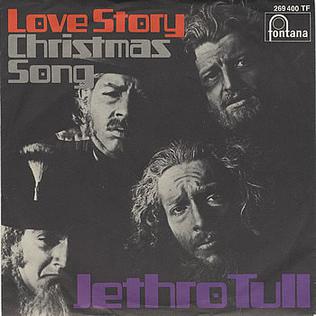
"Love Story" is the third single by British progressive rock group Jethro Tull. It was released in late November 1968. It reached No. 29 in the UK Singles Chart in January 1969, spending eight weeks on that chart.
Andy Pyle is a British bassist who is best known for playing with The Kinks from 1976 to 1978. Prior to that, he was in Blodwyn Pig (1968–1972) and Savoy Brown (1972–1974). Later, he played with Wishbone Ash.

Jack in the Green: Live in Germany 1970–1993 is a video by English rock band Jethro Tull, released in 2008. It comprises in-concert footage recorded in Germany by the band from 1970 to 1993.
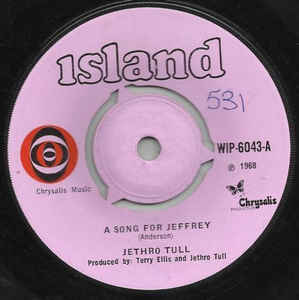
"A Song for Jeffrey" is a song recorded by the English progressive rock band Jethro Tull, released as their second single in the U.K. However, in the U.S., it was the B-side to "Love Story". It is written in honour of Ian Anderson's friend and future Jethro Tull bassist Jeffrey Hammond. Another version of the song was recorded for play on BBC radio.
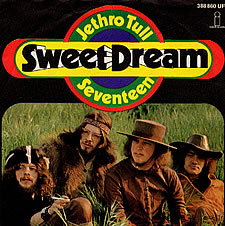
"Sweet Dream" is a song recorded by the English progressive rock band Jethro Tull on 31 August 1969, at Morgan Studios, London. It was their second straight UK Top Ten single, reaching number 7 in the UK Singles Chart. The b-side was a non-album track, "17", recorded on 11 September 1969, also at Morgan. It later appeared as a bonus track on remastered versions of Stand Up. "Sweet Dream" has appeared on many Tull compilation albums, while "17" has been rarely seen. In the UK, the single was the first release on Chrysalis Records.
References
- 1 2 3 4 5 Rabey, Brian (2013). A Passion Play: The Story of Ian Anderson & Jethro Tull. London: SoundCheck Books. pp. 28, 41. ISBN 978-0957144248 . Retrieved 27 November 2020.
- 1 2 3 "Jethro Toe-Sunshine Day". Discogs. 16 February 1968. Retrieved 9 November 2020.
- ↑ "Sunshine Day - Jethro Tull | Listen, Appearances, Song Review". AllMusic . Retrieved 2015-05-06.
- ↑ "Sunshine Day - Jethro Toe (A.K.A. Tull) - | Listen, Appearances, Song Review". AllMusic. Retrieved 2015-05-06.
- ↑ "Various-Rare Tracks". Discogs. 1975. Retrieved 9 November 2020.
- ↑ "25 Very Rare Masters From The Sixties". Discogs. 1996. Retrieved 9 November 2020.